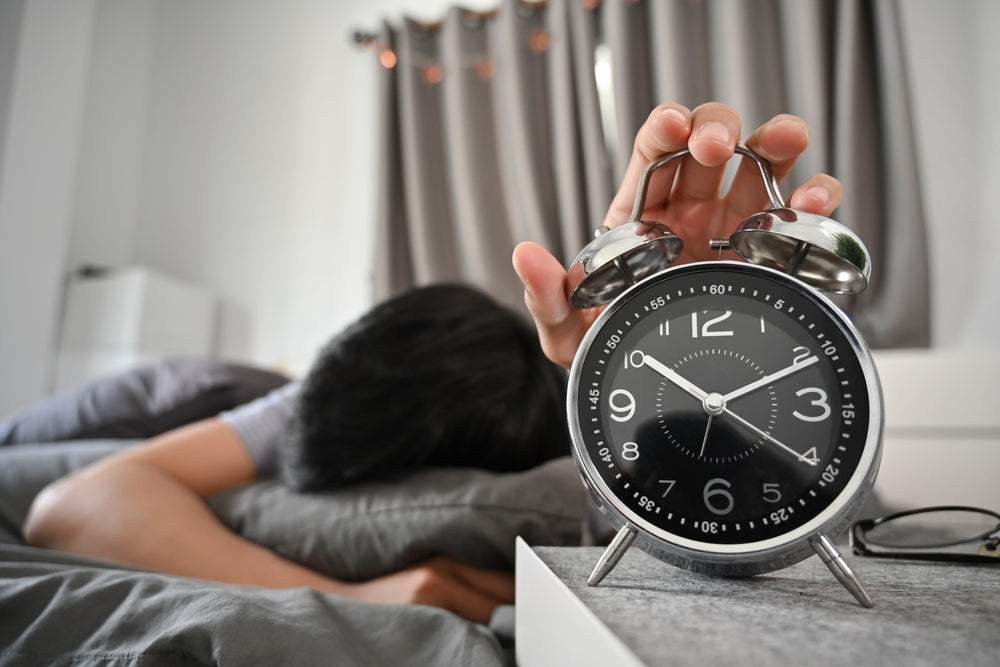Free U.S. Shipping On Orders Over $150

Sleep Quality VS. Sleep Quantity: Why They Are Both Equally Important
Posted on
Quality over quantity is true for a lot of things in life — clothes, food and even friends. But it doesn't hold when it comes to sleep (or money for that matter). Good sleep requires both the right amount of sleep as well as the right quality.
That’s why you could sleep for 8 hours, but still wake up groggy and sleep deprived. Or you could be deeply asleep for 6 hours, and still spend the day in a mental fog.
In this post we explain what quality and quantity mean when it comes to sleep, and how to improve your sleep on both metrics.
What is Sleep Quantity?
Sleep quantity is simply the duration of your sleep. For many of us, it is woefully short. While Americans have generally started sleeping for longer than in previous years (partly because of the increase in remote work), too many people still sleep for less than 6 hours a night according to a survey.
The recommended sleep duration is 7-9 hours. Most of us have a sweet spot of about 8 hours, but some are fine with a little less while others need an extra hour of sleep to feel fully rested.
What is Sleep Quality?
Sleep quality is how well you sleep. Good quality sleep involves, first and foremost, getting the right amount of sleep. Sleep quantity is one aspect of sleep quality. But sleeping for 8 hours doesn't mean you slept well. For one reason or another, you could still wake up feeling tired, sleepy and unrefreshed.
Good sleep quality involves going through all the four sleep stages.
Each stage of sleep plays a role when it comes to memory, recovery, learning, mood and other things. So if you miss some stages or don't spend enough time in particular stages, it’s going to affect you negatively even if you’ve been in bed for eight hours.
For instance, sleep disorders can lower sleep quality by preventing deep sleep. Noise, light or the wrong sleep temperature can also keep you from going into deep restorative sleep.
There are many different terms that describe various aspects of sleep quality. Here are some of them.
- Sleep latency — how long it takes you to fall asleep. Falling asleep too quickly (in under 8 minutes) or taking too long to sleep (over 20 minutes) are both signs your sleep quality is lacking.
- Sleep efficiency — How much time you spend asleep compared to how much time you spend lying in bed.
- Sleep fragmentation — Short and frequent interruptions of sleep. You may not even be aware of them. They are the reason you could be asleep for eight hours but still experience daytime sleepiness.
Why Sleep Quantity and Quality are Inseparable
The reason there’s no such thing as sleep quality vs. quantity is that they both refer to the same thing — how well do you sleep.
As we said, sleep quantity is an essential part of sleep quality. If you sleep for less than 6 hours, that’s low quality sleep no matter how deeply you sleep. You will clearly feel the effects of sleep deprivation.
So what really matters in the end is the quality of your sleep. This includes how long you sleep and how well you sleep.
How to Improve Your Sleep Quality (Including Quantity)
The most important step in getting better quality sleep is figuring out where you are struggling when it comes to sleeping well.
For most of us, our biggest problem is sleep duration. We are simply not sleeping long enough. For others, it could be that they are not sleeping deeply.
Go further and figure out why you are not getting the right amount or quality of sleep. Common culprits include:
- Long working hours.
- Mental health conditions like stress and anxiety that lead to insomnia.
- A poor sleep environment.
- Staying up late watching, browsing on the phone or gaming.
- Poor physical health.
- Sleep disorder.
You may need to consult your doctor or a sleep specialist to help you understand why you are not sleeping well.
Once you figure out the specific reasons for your poor sleep quality, it becomes a lot easier to start making improvements.
For example, you can adopt a regular sleep routine that limits your screen time in the evening and ensures you are in bed early and at the same time every day.
Improving your sleep environment also goes a long way in getting high quality sleep. This includes keeping your bedroom dark, maintaining a cool temperature and getting comfortable bedding like our soft and breathable Jax sheets.
Getting in more exercise, finding ways to lower stress and getting treatment for sleep disorders are other ways to sleep longer and better.
Quick links
Contact
6063 Hudson Road #160
Woodbury, MN 55125
Yo@hercLeon.com
Leave a comment: